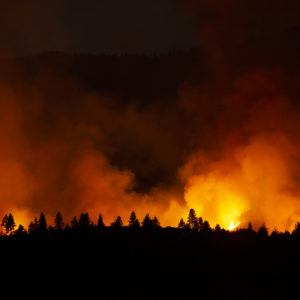Editor’s Note: For another viewpoint, see Counterpoint: Man-Made Policies, Not Man-Made Climate Change, Are Fueling Wildfires
In southern Oregon, we have been living with the effects of climate change for years.
Our summers are hotter, drier and increasingly smoky due to wildfires. Smoke has shut down performances at the Oregon Shakespeare Festival and endangered the health of outdoor workers, while our rivers bloom with toxic algae.
But nothing makes you feel the effect of climate change bone deep like watching your community turn to ash.
I’m the executive director of Rogue Climate and a lifelong resident of the Rogue Valley in southern Oregon. After fleeing our homes with our friends and families while entire communities went up in flames Sept. 8, my colleagues and I can say with authority that the climate crisis is here today, and it’s a direct threat to public health and safety.
Our office in Phoenix, Oregon, burned to the ground.
Our region is not a stranger to wildfire, which is a natural part of the forest ecosystem, and fire has been used by indigenous communities to care for the forests for millennia. But climate change is changing how fire operates in the West.
These wildfires were a perfect storm: dry forests and strong easterly winds that pushed fires from forested areas into populated towns. Thousands of people had to evacuate their homes, setting aside concerns about the COVID-19 pandemic to stay with friends or at shelters.
When it was all said and done, the fire destroyed much of the small towns of Talent and Phoenix, and burned into Medford. More than 1,700 homes and businesses burned.
So what can we learn from this unprecedented climate-driven catastrophe? A lot, it turns out:
Climate Solutions Improve Lives Now
As winds picked up, electric utilities were forced to turn off the power in Talent to avoid sparking more fires.
Our organization, along with others, set up mobile charging stations where displaced families could charge electronics, enabling them to let frightened friends and family know that they were safe.
Now our team is collecting and distributing emergency supplies — water, tents, N95 masks and more — to people who lost everything to the fires.
In a world of more extreme weather, locally owned, resilient power systems driven by clean energy will be key to picking up the pieces after a disaster. Homes and community centers with rooftop solar and batteries don’t have to wait for power lines to be repaired. Talent has a commitment to reach 100 percent clean energy by 2030 and has one of the most aggressive clean energy action plans in the state.
These kinds of clean energy efforts help accelerate the transition away from the fossil fuel projects that heat the atmosphere, like the massive proposed Jordan Cove liquified natural gas export terminal that would cut an explosive pipeline through Oregon.
Everyone Deserves Clean Air
Those who didn’t lose homes have still been forced to live with choking wildfire smoke that poses an immense risk to peoples’ respiratory health.
Much of the West Coast has registered unhealthy or hazardous air quality for more than a week, forcing people to stay indoors. Scientists say prolonged exposure to wildfire smoke can lead to decreased lung function, higher rates of respiratory problems and potentially more deaths in patients battling COVID-19.
Eventually, Pacific Ocean winds will clear the smoke, and a combination of autumn rains and the round-the-clock work of brave local firefighters will put out the fires.
But many communities across the country don’t get to take a break from living with unhealthy air. Industrial factories, power plants and freeways disproportionately pollute neighborhoods with large populations of Black, indigenous and other people of color.
Here in southern Oregon, large proportions of Latinx workers have outdoor jobs in agriculture, construction or forestry, where they are exposed to toxins daily and can’t afford to take a day off when air quality gets hazardous.
Our temporary air quality nightmare is the day-to-day reality for many of our neighbors.
While climate change is clearly here now, there are still better and worse possible futures — and which future we will get depends on what we do today. For decades, corporate special interests have been able to block urgent climate action despite scientists’ warnings.
These fires underscore that we simply can’t let that happen any longer. So as we show up to support our community and rebuild, we have to start implementing large-scale solutions now.
It is a matter of justice. It is a matter of survival.

